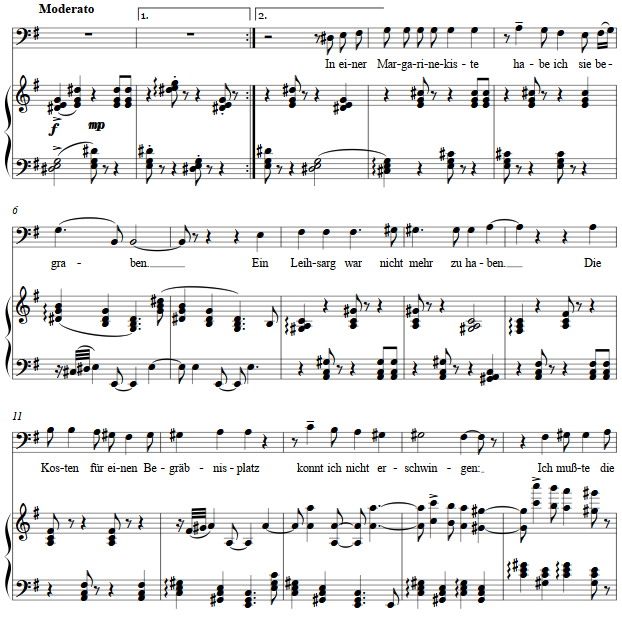Music and Texts of GARY BACHLUND
Vocal Music | Piano | Organ | Chamber Music | Orchestral | Articles and Commentary | Poems and Stories | Miscellany | FAQs
Berliner Mittelstandsbegräbnis - (2015)
Klabund
for baritone and piano
In einer Margarinekiste habe ich sie begraben.
Ein Leihsarg war nicht mehr zu haben.
Die Kosten für einen Begräbnisplatz konnt ich nicht erschwingen:
Ich mußte die Margarinekiste mit der teueren Entschlafenen auf einem Handwagen
in die Laubenkolonie am schlesischen Bahnhof bringen.
Dort habe ich sie in stockfinsterer Nacht
Unter Kohlrüben zur ewigen Ruhe gebracht.
Aber im Frühling werden aus der Erde Kohlrüben, die sie mit ihrem Leibe gedüngt,
zum himmlischen Lichte sprießen,
Und der Hilfsweichensteller Kraschunke wird sie zum Nachtmahl genießen.
Während sie noch in der Pfanne (in Margarine-Ersatz) schmoren und braten,
Bemerkt Frau Kraschunke erfreut: »Die Kohlrüben sind dieses Jahr
aber ungewöhnlich groß geraten...«4 pages, circa 3' 15"
Klabund's text is found in the collection, Die Harfenjule, Berlin, 1927.
In a margarine box I interred you.
A coffin was just not to be had.
Burial costs were too unreasonable:
I had to bring the margarine box containing its dear departed on a hand truck
to the garden colony near the Silesian train station.
There in the pitch-black night
you were laid to rest under the turnips.
But in spring the turnips will grow, those which you fertilized,
sprouting to the heaven's light.
And the trainman's assistant Kraschunke will enjoy his dinner.
As they braise and cook in the pan with a margarine substitute,
Missus Kraschunke will happily remark: "The turnips this year
turned out remarkably well...."
unrhymed paraphrase of the composer
The setting is an ABA form of sorts, for the return to the first line text and another from the second strophe. The musical imagery is meant to invoke the early 20th century as Berlin experienced so many tragic upheavals. The "middle class interment" as Klabund titles the poem was a factual event as the economy collapsed, something which happened several times over decades. That the middle class, as an economic class, could be buried in so small and unimportant a wooden box is itself an editorial. Alas, the lessons of history and the significant errors of successive governments are lost, as Europe again faces such stresses on its middle class as to shake foundations of entire governments and their temporary regimes. The strikes at the end of the 19th century and then the "Kohlrübenwinter" of 1916-17 which gave way to a massive government-led inflation, these were answered by the next heinous political trend which destroyed Berlin and its middle class again. Without fail the lessons of the collapsed DDR and its economic failures which followed World War II and built the infamous Berlin Wall suggest a consistency in which political movements pretend to answer destructive issues with yet more destructive issues, seeming to bury the middle class with a regularity which should astound the reasonable observer.
The margarine box is imagery to speak to butter becoming too expensive, and then margarine as well, such that the two named characters in this small vignette braise their vegetables grown on their small allotment of land with a "Margarine-Ersatz," the cheaper cooking oil as available economically to the lower classes. The mention of the Silesian Station and garden allotments near it speak of a modernity in its time alongside the notion of small contracted plots of land for city dwellers to garden and farm. The poem's Kraschunke is a train worker, a switchman.
The setting begins, aggressively punctuated, and then settles into an oompah figuration as the text is declared by the baritone. The harmonic darkness of the opening yields to a more rhapsodic middle section, with the envisioning of spring and its first shoots, only to return as Mister and Missus Kraschunke are imagined enjoying their corpse-fertilized turnips.

The score is available as a free PDF download, though any major commercial performance or recording of the work is prohibited without prior arrangement with the composer. Click on the graphic below for this piano-vocal score.
Berliner Mittelstandsbegräbnis
